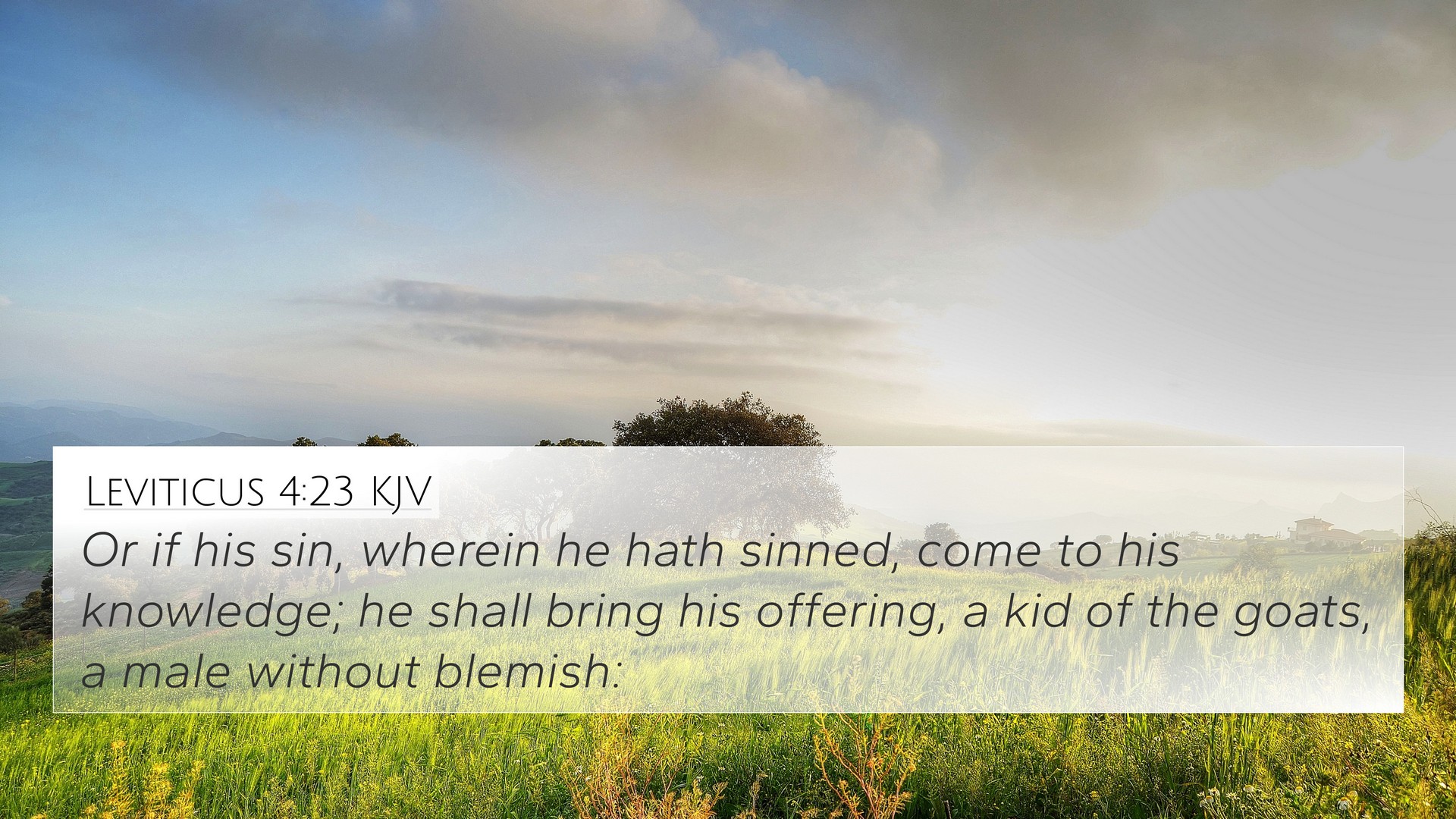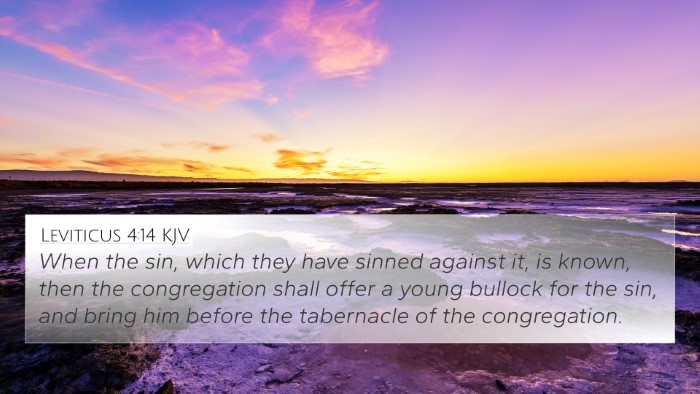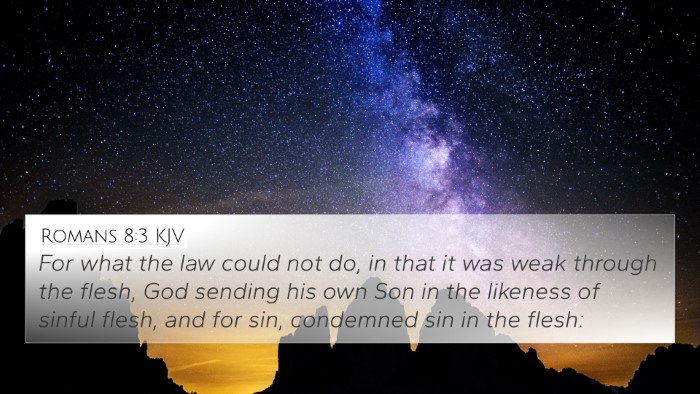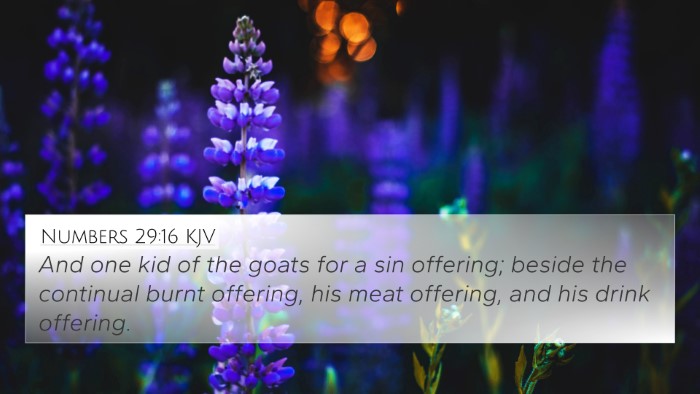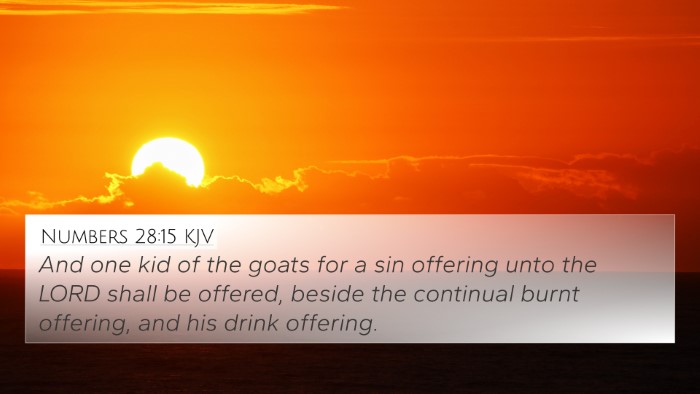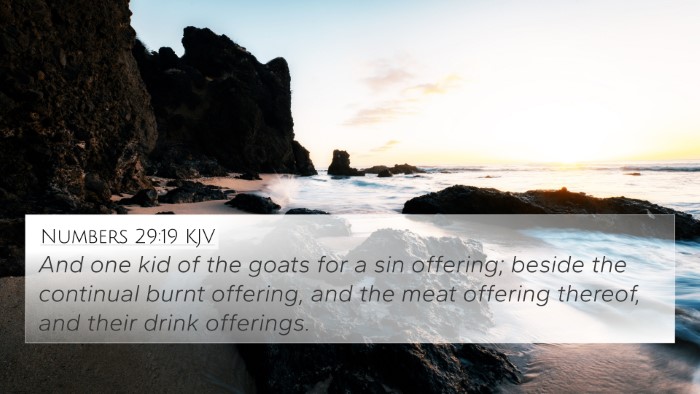Understanding Leviticus 4:23
Leviticus 4:23 states: "Or if his sin, wherein he hath sinned, come to his knowledge; he shall bring his offering, a kid of the goats, a male without blemish." This verse forms part of the instructions given to the Israelites regarding sin offerings and emphasizes the importance of acknowledging one's sins and seeking atonement.
Overall Context and Significance
This directive highlights several key spiritual principles in the Old Testament, particularly the concepts of sin, guilt, and the need for atonement through sacrificial offerings. The sacrificial system provided a means for individuals to restore their relationship with God after transgressing His commandments.
Summary of Key Insights from Commentaries
- Matthew Henry: He emphasizes the necessity of confession of sin and the presentation of an offering. This act symbolizes not only repentance but also a recognition of the gravity of sin in the life of an individual.
- Albert Barnes: Barnes underscores the requirement of a suitable offering. The male kid of the goats is seen as a representation of innocence and purity, highlighting the need for unblemished sacrifices when seeking to atone for one's mistakes.
- Adam Clarke: Clarke points out the significance of personal awareness in the act of sin. The phrasing suggests that awareness comes before the offering, indicating that one must consciously acknowledge their guilt as part of the path toward repentance and redemption.
Bible Verse Cross-References
Several Bible passages relate closely to Leviticus 4:23, expanding our understanding of sin offerings and atonement. Here are some significant cross-references:
- Exodus 29:10-14: Instructions regarding the sin offering and the importance of proper sacrifices.
- Leviticus 4:27-31: Further details on sin offerings for individuals and the necessity of bringing a perfect animal.
- Hebrews 9:22: "And according to the law almost all things are purified with blood, and without shedding of blood there is no remission." This verse connects the Old Testament sacrificial system with Christ's ultimate sacrifice.
- 1 John 1:9: This New Testament passage encourages believers to confess their sins, promising that God is faithful and just to forgive.
- Isaiah 53:6: Speaks of the collective sinfulness of humanity and the healing found in the "suffering servant", foreshadowing Christ's redemptive work.
- Romans 6:23: The wages of sin is death, but the gift of God is eternal life through Jesus Christ, linking sin with its consequences and God’s provision for salvation.
- Psalm 51:17: Highlights God's desire for a broken spirit as the appropriate response to sin, echoing the themes of repentance and sacrifice.
Connections Between Bible Verses
Leviticus 4:23 serves as a vital link in the larger thematic tapestry of Scripture regarding sin and atonement. The interconnectedness of these verses provides a fuller understanding of how the sacrificial system anticipated the ultimate sacrifice of Jesus Christ.
Comparative Bible Verse Analysis
By analyzing the correlations between these verses, we can observe how the Old Testament sacrificial laws prefigure the New Testament's teaching on sin and redemption:
- Old Testament Sacrifices: The necessity of bringing a sacrifice (Leviticus 4:23) demonstrates the principle of substitutionary atonement—an innocent lamb or goat pays the price for the sin of the transgressor.
- Fulfillment in Christ: The completion of this sacrificial system is seen in Jesus' declaration as the "Lamb of God" (John 1:29), indicating the ultimate fulfillment of the sacrificial principles laid out in Leviticus.
How to Use Bible Cross-References
Cross-referencing plays an essential role in enriching one’s understanding of Scripture. By utilizing tools for Bible cross-referencing such as Bible concordances or cross-reference guides, readers can explore:
- Thematic Bible verse connections that reveal God's overall plan for humanity.
- Comparative studies of Pauline epistles and their connections to Old Testament teachings, especially regarding sin and grace.
- Understanding the nature of God’s justice and mercy through sacrificial language which recurs throughout the biblical narrative.
Conclusion
Leviticus 4:23 emphasizes the necessity of acknowledgment of sin and the provision for atonement. By understanding this verse in light of its context and cross-references, we gain deeper insight into the narrative of redemption that permeates Scripture. Through the lens of both Old and New Testaments, believers can appreciate the consistent message of sin, repentance, and salvation through Christ.
